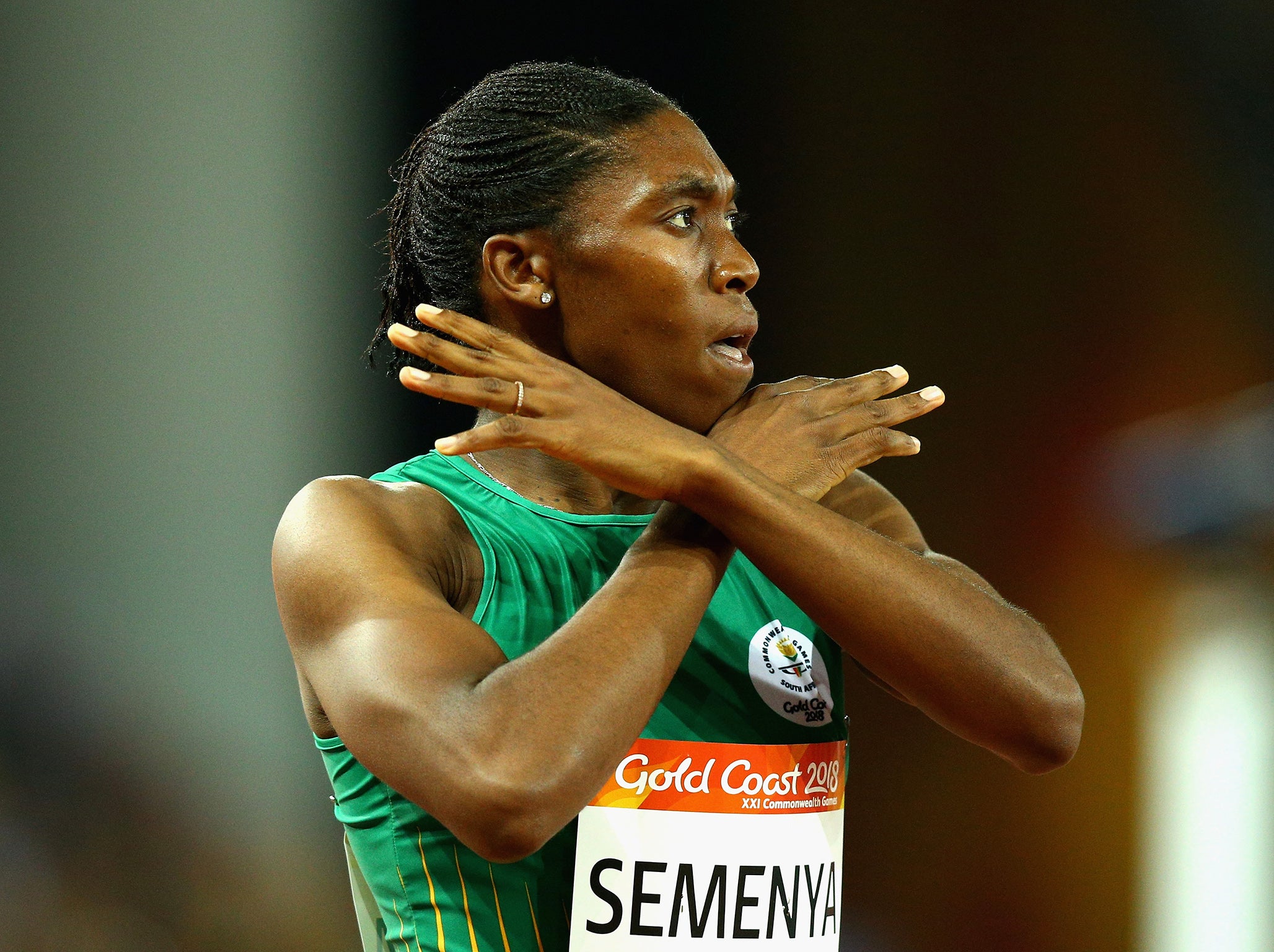Caster Semenya expected to be affected by IAAF rule changes that limit testosterone levels for females
The rule changes have been denounced as racist by South Africa's ruling political party

Your support helps us to tell the story
From reproductive rights to climate change to Big Tech, The Independent is on the ground when the story is developing. Whether it's investigating the financials of Elon Musk's pro-Trump PAC or producing our latest documentary, 'The A Word', which shines a light on the American women fighting for reproductive rights, we know how important it is to parse out the facts from the messaging.
At such a critical moment in US history, we need reporters on the ground. Your donation allows us to keep sending journalists to speak to both sides of the story.
The Independent is trusted by Americans across the entire political spectrum. And unlike many other quality news outlets, we choose not to lock Americans out of our reporting and analysis with paywalls. We believe quality journalism should be available to everyone, paid for by those who can afford it.
Your support makes all the difference.New rules for female athletes with high natural testosterone levels could force two-time Olympic 800-meter champion Caster Semenya to stop running middle-distance races, and were denounced as racist by South Africa's ruling political party.
The IAAF said on Thursday that from Nov. 1 it will limit entry for all international events from 400 meters through the mile to women with testosterone levels below a specified level.
Women with elevated testosterone must reduce their level for "six months (e.g., by use of hormonal contraceptives)" before being eligible to run, and maintain that lowered level.
The African National Congress party said it supports Semenya in "yet another attempt ... to exclude and discriminate against her."
"We call on government to challenge this grossly unfair, unjust and blatant racist attempt by the IAAF to the Court of Arbitration for Sport and have these regulations set aside," the ANC said in a statement.
The new rules could yet be challenged, including by Semenya, at sport's highest court in Lausanne, Switzerland. CAS already has ruled once against the IAAF in trying to impose rules on hyperandrogenism.
IAAF president Sebastian Coe said it had "a responsibility to ensure a level playing field for athletes ... where success is determined by talent, dedication and hard work rather than other contributing factors."
"Our evidence and data show that testosterone, either naturally produced or artificially inserted into the body, provides significant performance advantages in female athletes," Coe said in a statement.

Semenya now faces taking daily medication or start racing at 5,000 meters. Without the rules, the 27-year-old South African would likely defend her 800 world title in Doha, Qatar, next year. She also took bronze in the 1,500 at the 2017 worlds in London.
In 2011, the IAAF enacted a rule to force athletes with hyperandrogenism to artificially lower their testosterone levels to be eligible to compete. Two years earlier, Semenya clocked a 1-minute, 55-second time to win her first world title as a teenager in Berlin. While the previous rules were enforced, her season-best times were around 1:59 or slower.
The previous rules were challenged at CAS by sprinter Dutee Chand of India and overturned before the 2016 Olympics. In Rio de Janeiro, Semenya retained her Olympic title, running 1:55.28.
On her Twitter account on Wednesday, Semenya did not comment but posted an image of the statement: "How beautiful it is to stay silent when someone expects you to be enraged."
Semenya hinted at a potential shift to the longer distance events later in her career after clinching an 800-1,500-meter double at the Commonwealth Games in Australia earlier this month.
After winning the 800 in a meet-record 1 minute, 56.68 seconds, Semenya was asked about her plans to challenge the world record of 1:53.28 set by Jarmila Kratochvilova in 1983.
"I'm still young — just turned 27. Still want to have three, four ... months before I decide if I want a world record or not," she said. "What's important now is to be able to win every race that I run."
At the time, she was targeting an 800-1,500 double at every major championship right through to the Tokyo 2020 Olympics.

"We need to run four championships in doubles and then decide if we still have speed for the 800," she said. "If we do, we continue with 800. If not, we go further. We have 5,000 and 10k — I believe I can still do better in future.
"I feel I can fit into distance running. For me, this is more than a game."
The ANC statement on Thursday was accompanied by a photograph of Semenya being embraced by Winnie Madikizela-Mandela, the anti-apartheid icon who died this month at age 81.
The South African Olympic body's president said it was "disappointed by the IAAF ruling, and especially given that Caster's name is again being dragged through the publicity mill."
"We are concerned that the decisions have been approved without taking into account all factors," Gideon Sam said, adding that athletes' "dignity and human rights are at the top of the agenda."
Still, the IAAF said on Thursday there was "broad medical and scientific consensus, supported by peer-reviewed data and evidence" to back its position.
"There is a performance advantage in female athletes with DSD (Differences of Sexual Development) over the track distances covered by this rule," Dr. Stephane Bermon, who works in the IAAF medical and science department, said in the statement.
Research over a decade showed 7.1 in every 1,000 elite track and field athletes had elevated testosterone levels — a ratio 140 times greater than the general female population.
"The treatment to reduce testosterone levels is a hormone supplement similar to the contraceptive pill taken by millions of women around the world," Bermon said. "No athlete will be forced to undergo surgery."
Testosterone is a naturally produced steroid that helps maintain muscle mass, and production of oxygen-carrying red blood cells. For male athletes, anti-doping rules require further study for potential abuse if the ratio of testosterone to epitestosterone in a urine sample is above a specified level.
Join our commenting forum
Join thought-provoking conversations, follow other Independent readers and see their replies
Comments